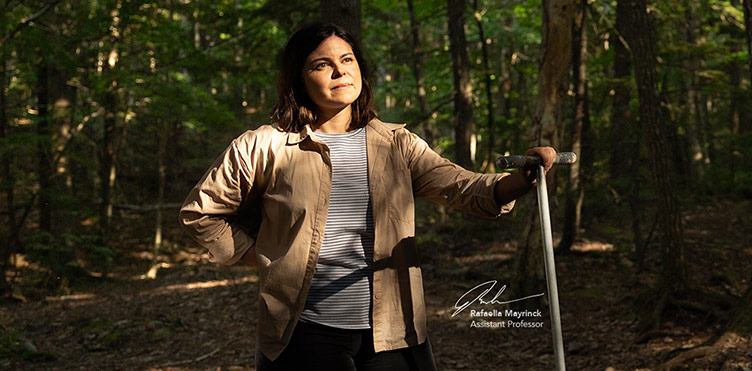
Forests captivated Dr. Rafaella Mayrinck as a child in Brazil, where she loved spending time outdoors.
She is someone whose mind always asked big questions and felt inclined toward solving problems. This thinking, and that first love, led her to the University of New Brunswick (UNB), where she now works as part of a research team focused on mitigating climate change effects on Atlantic Canada forests.
It was never lost on Dr. Mayrinck, even in her youth, that as an important source of raw materials, forests needed to be properly conserved and managed in the fight against climate change. This was especially evident to her in Brazil, where her forestry studies included coursework and survival-skill learning in Amazon rain forests. This immersive learning showed her how solutions-based approaches, can grow and preserve forests for future generations.
After graduating, Dr. Mayrinck dove into private sector and academia forestry roles before joining UNB’s Faculty of Forestry & Environmental Management in February 2024. She has since become the TransX research initiative research lead at UNB’s Fredericton campus. This project was launched by Dr. Loïc D’Orangeville, a former UNB researcher and faculty member who is now at l’Université Laval in Québec.
As part of the TransX initiative, Dr. Mayrinck studies how trees respond to future warming, leaf and growth phenology, health, and survival across species and populations. This initiative’s goal is to determine how to protect these forests as long-term sources of wood products and carbon sequestration.
“We are taking genetic materials from different [tree] species and planting them in different places in North America so we can see which genetic materials and species behave better in different environments,” she says.
“[With this understanding], we can do something called assisted migration because, in the future, the climate will change a lot, so we know which species you plant on each side [of the border], so we don't have our forests just dying.”
Dr. Mayrinck is proud to be part of this UNB-led project, and to collaborate with research partners and look at forests across Canada and the United States. It’s an opportunity to put theory into action and for UNB researchers to go beyond the classroom and learn from the world around them. The Boreal Forest site in northern New Brunswick, and the Acadian Forest site near Fredericton, are places Dr. Mayrinck says are fascinating to conduct research in, as they are key to future survival of global woodlands.
“I'm really happy to be here,” says Dr. Mayrinck. “For me, it's an honour to do research in this rare kind of forest," says Dr. Mayrinck, of working in the Acadian forest.